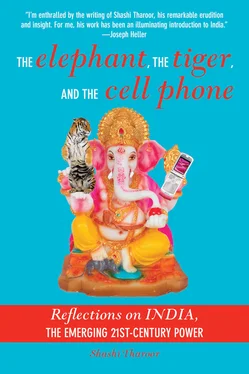It is possible to a great extent to speak of Hinduism as culture rather than as religion (a distinction the votaries of Hindutva reject or blur). Interestingly, similar Hindu customs have survived in now-Muslim Java and now-Buddhist Thailand. Islamic Indonesians still cherish the Ramayana legend, now shorn (for them) of its religious associations. Javanese Muslims bear Sanskrit names. Hindu culture can easily be embraced by non-Hindus if it is separated from religious faith and treated as a heritage to which all may lay claim.
The economist Amartya Sen made a related point in regretting the neglect by the votaries of Hindutva of the great achievements of Hindu civilization in favor of its more dubious features.
As Sen wrote: “Not for them the sophistication of the Upanishads or Gita, or of Brahmagupta or Sankara, or of Kalidasa or Sudraka; they prefer the adoration of Rama's idol and Hanuman's image. Their nationalism also ignores the rationalist traditions of India, a country in which some of the earliest steps in algebra, geometry, and astronomy were taken, where the decimal system emerged, where early philosophy — secular as well as religious — achieved exceptional sophistication, where people invented games like chess, pioneered sex education, and began the first systematic study of political economy. The Hindu militant chooses instead to present India — explicitly or implicitly — as a country of unquestioning idolaters, delirious fanatics, belligerent devotees, and religious murderers.”
Sen is right to stress that Hinduism is not simply the Hindutva of Ayodhya or Gujarat; it has left all Indians a religious, philosophical, spiritual, and historical legacy that gives meaning to the civilizational content of secular Indian nationalism. In building an Indian nation that takes account of the country's true Hindu heritage, we have to return to the pluralism of the national movement. This must involve turning away from the strident calls for Hindutva that would privilege a doctrinaire view of Hinduism at the expense of the minorities, because such calls are a denial of the essence of the Hinduism of Vivekananda. I say this not as a godless secularist, but as a proud Hindu who is mortified at what his own faith is being reduced to in the hands of bigots — petty men who know little about the traditions in whose defense they claim to act.
3. The Politics of Identity
I'LL TELL YOU WHAT YOUR PROBLEM IS IN INDIA,” the American businessman said. “You have too much history. Far more than you can use peacefully. So you end up wielding history like a battle-ax, against each other.”
The American businessman doesn't exist; he is a fictional character in my novel Riot, about a Hindu-Muslim riot that erupts in the course of the Ram Sila Poojan campaign, the forerunner of the agitation to construct a Ram Janmabhoomi temple on the site occupied for four and a half centuries by the Babri Masjid. As headlines in recent years have too often spoken of a renewed cycle of killings and mob violence over the same issue, I have received dozens of comments on the eerie similarity between art and life.
In the wake of the awful Gujarat riots — some might well call them a pogrom — in 2002, which took somewhere between a thousand and two thousand, overwhelmingly Muslim, lives, some callers pointed to the afterword of Riot, published just a few months earlier, in which I alerted readers to the threat by Hindu extremists to commence construction of their temple in defiance of court orders. I seek no credit for prescience. The tragedy in India is that even those who know history seem condemned to repeat it.
It is one of the ironies of India's muddled march into the twenty-first century that it has a technologically inspired vision of the future and yet appears shackled to the dogmas of the past. The temple town of Ayodhya has no computer software labs; it is devoted to religion and old-fashioned industry. In 1992, a howling mob of Hindu extremists tore down the Babri Masjid, a disused sixteenth-century mosque that occupied a prominent spot in a town otherwise overflowing with temples. The mosque had been built in the 1520s by India's first Mughal emperor, Babur; the Hindu zealots vowed to replace it with a temple to Lord Ram, which, they say, had stood on the spot for millennia before the Mughal invader tore it down to make room for his mosque. In other words, they want to avenge history, to undo the shame of half a millennium ago with a reassertion of their glory today.
I remember vividly an American friend at a function in New York on December 6, 1992, telling me he had seen on the news that the Babri Masjid had been destroyed, and my simply refusing to believe it. “You must have heard it wrong,” I asserted confidently. “That sort of thing simply wouldn't happen in India. And if some mob had actually tried to attack it, the police would have stopped them well before they destroyed the mosque. Maybe the TV reported it was damaged?” “It was destroyed,” the American retorted. “I didn't just hear it on TV. I saw it. It was destroyed in full view of the cameras.”
It took a while for my initial disbelief to dissipate. This couldn't have happened, I agonized, in the India I had grown up in. Of course, there had been riots in my youth, but they were spontaneous eruptions, and, for the most part, had been quickly brought under control. But an organized effort to pull down a mosque? The very thought was appalling — something I did not believe Indians, as a collectivity, were capable of contemplating.
And if they were, surely they wouldn't be allowed to complete the task? The destruction of a substantial building takes time, and I couldn't believe the authorities would have let the mob have the hours they needed to fulfill their malign intent. The India in which this could happen was an India that had changed immeasurably from the country in which I had reached adulthood. It was from a profound sense of loss and betrayal that I wrote, and spoke, of my anguish at the time.
Indians in New York were just as exercised as Indians in India. I recall two events in particular. That December I was invited, along with others, to speak at an event at Columbia University at which artists and writers responded to the tragedy. In the time allotted to me I chose to read three extracts from other writers — Tagore's immortal “Let My Country Awake,” from his Gitanjali; a poignant short story by Saadat Hasan Manto about looters at the time of Partition who are helped and encouraged by a kind man who turns out to be the owner of the house being looted; and a brief passage from Salman Rushdie's The Satanic Verses, in which he talks about the Indian “Overartist,” using art as a metaphor for the palimpsest that is the Indian identity. To my astonishment the organizers, an anticommunal group, came to me afterward to say that a number of Muslims in the audience had been outraged by my choice of the last passage. Did I not know that Rushdie was anathema to them? Could I dis-avow him and apologize? It was my turn to be outraged. I had not come to lend my voice to a denunciation of Hindu intolerance in order to condone Muslim intolerance.
There was nothing remotely offensive to anybody about the passage I had read; its content, its evocation of Hindu and Muslim artists painting over each other's work, was precisely what I had come to affirm. In choosing this passage by a great Indian Muslim writer I was seeking to uphold the idea of the pluralist, tolerant India that had been attacked along with the Masjid. I refused to apologize, let alone disavow what I had read. But it was a sobering reminder that intolerance comes in many shades.
The second episode at the time was an address I was invited to make to the Indian community at the consulate in New York. A number of Hindutva sympathizers turned up for the question-and-answer session that was to follow, prepared to denounce the “pseudo-secularism” that they expected would underlie my critique.
Читать дальше












